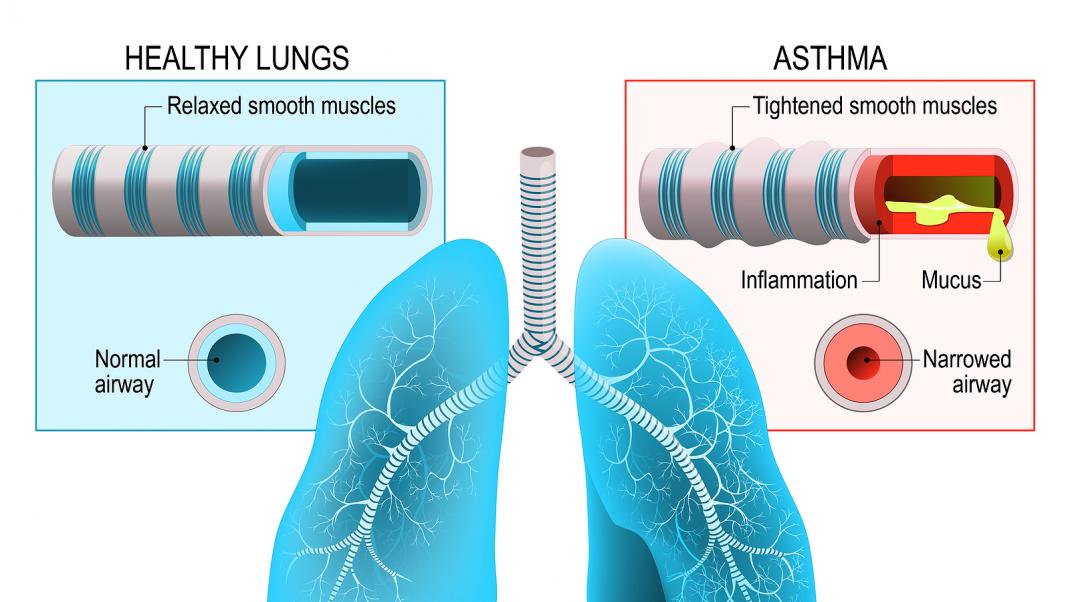Asthma causes swelling and narrowing of the airways in your lungs.
No one is exactly sure what causes asthma. It is believed to be a combination of inherited and environmental factors.
Healthy Lungs
Inside the lungs there are branching airways made of stretchy tissue. Each airway is wrapped with bands of muscle. The airways are more narrow as they go deeper into the lungs. The smallest airways end in clusters of tiny balloon-like air sacs (alveoli). These clusters are surrounded by blood vessels. When you inhale (breathe in), air enters the lungs. It travels down through the airways until it reaches the air sacs. When you exhale (breathe out), air travels up through the airways and out of the lungs. The airways produce mucus that traps particles you breathe in. Normally, the mucus is then swept out of the lungs, by tiny hairs (cilia) that line the airways, to be swallowed or coughed up.
What the Lungs Do
The air you inhale contains oxygen. When oxygen reaches the air sacs, it passes into the blood vessels surrounding the sacs. Your blood then delivers oxygen to all of your cells. Carbon dioxide is removed from the body in a similar way, as you exhale.
Symptoms of chronic inflammation
-
Coughing
- Chest tightness
- Shortness of breath
- Wheezing (a whistling noise, especially when breathing out)
- Low energy or feeling tired
- Over time, chronic mild inflammation can lead to permanent scarring of airways and loss of lung function.
- Moderate flare-ups
When sensitive airways are irritated by a trigger, the muscles around the airways tighten. The lining of the airways swells. Thick, sticky mucus increases and clogs the airways. All of this makes you work harder to keep breathing.
Symptoms of moderate flare-ups
- Coughing, especially at night
- Getting tired or out of breath easily
- Wheezing
- Chest tightness
- Faster breathing when at rest
Severe flare-ups
Severe flare-ups are life-threatening. They can cause brain damage or death. In a severe flare-up, the muscle tightening, swelling, and mucus production are even worse. Breathing is challenging. Your body can't get enough oxygen and can't remove carbon dioxide. Waste gas is trapped in the alveoli, and gas exchange can’t occur. The body is not getting enough oxygen. Without oxygen, body tissues, especially brain tissue, begin to die. If this continues for long, it can lead to brain damage or death.
Call 911, or have someone call for you if you have any of these symptoms and they are not relieved right away by taking your quick-relief medication as prescribed:
- Severe difficulty breathing
- Being too short of breath to talk or walk
- Lips or fingers turning blue
- Feeling lightheaded or dizzy, as though you are about to pass out
- Peak flow less than 50% of your personal best if you use peak flow monitoring
Because asthma is a long-term condition, working with your healthcare provider to manage it is crucial. If you smoke, get help to quit. Know your triggers and figure out how to avoid them. And it is essential that you take your medications as instructed. That means taking them, even when you feel good.

